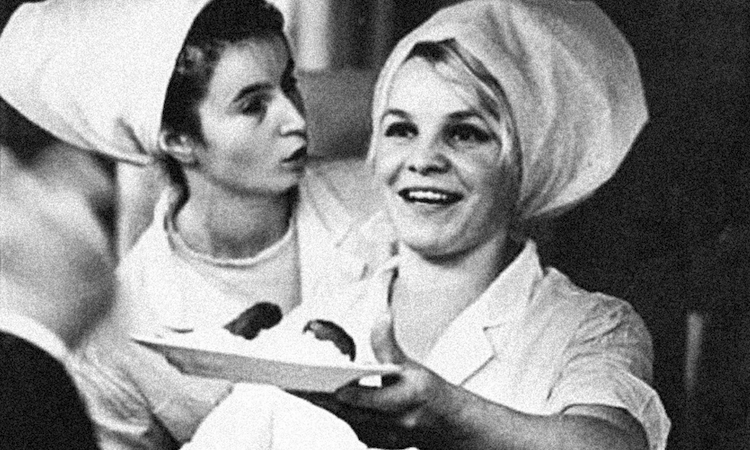To have the correct attitude towards a phenomenon we must understand the cause, the magnitude, the quality, and the direction of change. The aim of this article is to give an overview of the quantity, quality and direction of change of poverty in Britain, its general causes, and our tasks in response.
Accelerating decline into poverty
The number of Britons in poverty exceeds 14.5 million – that is, one in five people. A disproportionate part of this number, 4.2 million, or nearly one in three, are children.
These numbers are increasing. Six hundred thousand people fell into poverty in the year 2022-23, half of whom were children. This is the greatest increase in the magnitude of poverty since the early 1980s.
There is an increase in the incidence of ‘working poverty’. One in five working-age adults, or around eight million, have fallen into poverty despite being employed. Most children in poverty have at least one working parent (70 percent).
An often-overlooked metric, but an important one, is the quality of poverty. In the mid-1990s, 31 percent of those in poverty were classed as being in ‘very deep poverty’. Now in the mid-2020s, that figure has grown to a shocking 42 percent; the ‘very deep poverty’ category is now the largest group of those in poverty.
Workers in this category are unable to meet the cost of one or all of the necessities of living such as food, heating, clothing, housing etc. They number around six million.
It is clear that living standards in Britain are not just continuing to deteriorate but that the rate of deterioration is accelerating. Without the resources to investigate directly, we must rely on notoriously massaged government statistics, which means that the shocking figures above are likely an underestimation of the breadth and depth of the poverty crisis currently unfolding in Britain.
The ruling class has every reason to try to hide the truth about the conditions of existence being faced by British workers in ever greater numbers.
Housing crisis deepening every year
Among the factors impoverishing workers are debilitating rents and property prices. On median pay after tax (around £2,500 per month), average rent (around £1,400) absorbs well over half a worker’s wages. To put this another way, many workers working five days a week, work three days just to pay the landlord. And since half of workers earn less than this median wage, the proportion of wages required to pay the rent is an even higher burden for most of the working class.
The steadily shrinking group of working-class ‘homeowners’ in Britain face a similar situation, with over half of their income going to service interest on mortgage loans that they will be paying for life. A large proportion of those who manage to scrape together a deposit face similar poverty and often higher housing costs when all the associated overheads of homeownership are factored in.
Homeownership alone is no shield against poverty. Loss of earnings owing to inflation affects every worker, as do the vagaries and fluctuations of interest rates and the housing market.
In addition to high costs of access, Britain’s housing stock has been deteriorating sharply in recent years. Six and a half million families live in cold, drafty, mouldy or damp homes, most being rented privately or through ‘social’ (in name only) housing management companies.
More recently, the damp, cold and mould problem has increased as a result of soaring energy costs. This has been blamed on Russia, but the truth is that it was the Nato imperialists who launched an economic war that they thought would destroy Russia – only to find it was their own economies they were destroying instead. Moreover, energy monopolies have taken advantage of the situation to indulge in ever more price gouging, resulting in record profits for the big providers even as Britons shiver in cold homes.
Rather than protecting the workers from these predatory practices, as is its official remit, the energy watchdog Ofgem has assisted in maintaining this predation – and the industry’s megaprofits. British workers have been bled dry, and too many families now struggle to heat their homes adequately without plunging into debt.
Cold homes put more strain on the body, and the build-up of condensation in unheated houses exacerbates respiratory diseases. These health-destroying homes are almost entirely occupied by those in poverty, whose health is likely to be already undermined as a result of inadequate nutrition and stress.
Homelessness on the rise
An ever-increasing number of Britons are denied even this ‘privilege’ and are homeless. An estimated 354,000 in England alone, including 161,500 children, spent the winter of 2024 without a home, many in ‘temporary’ (and extremely precarious, unhealthy and unsafe) accommodation. This was an increase of 44,500 (14 percent) over the previous year.
Homelessness amplifies the prevalence of social illnesses by an order of magnitude. The chances of being a victim of suicide, alcoholism, drug use, death by exposure to the elements, rape and murder are several times higher among homeless workers than those who have access to regular housing.
Homelessness cannot be attributed to a lack of housing. Seven hundred thousand homes stand empty; enough to provide shelter to those currently unhoused twice over. Considering this, the government’s proposals to lift regulations that govern construction and planning will only serve to facilitate greater profits for the construction monopolies; there is no reason to expect the housing crisis to be in any way improved.
Quite the reverse, in fact. Under capitalism, housebuilders are working to maximise profit, not to provide homes. They are keen to build on virgin countryside (fewer overheads) and green-belt land (higher-value land), avoiding much-needed redevelopment of brownfield sites, and their products are aimed at those with money to spend, not those in desperate need.
The issue here is one of distribution. You can’t pay? Then you don’t get. One in three renters would be rendered homeless if they were not in receipt of some form of benefit, and the government plans to reduce this already much weakened ‘safety net’.
As Friedrich Engels pointed out 150 years ago, under capitalist relations, houses are primarily exchange values and stores of wealth, not use values for assisting in the raising of families and the provision of comfortable rest. Until housing is brought into ownership by the people and produced and allocated for need, we won’t see an end to the housing crisis.
Hunger and malnutrition becoming widespread
Food prices have risen dramatically over the past few years, with continuous high price inflation since mid-2021 – at one point reaching an annual rate of 19 percent. Basic foodstuffs have been hit harder than luxuries, meaning that those least able to pay have suffered the most. As a result, British workers now have less access to food, and are eating less and lower-quality food, both of which have great effects on health and lifespan.
The food most workers can afford today is of exceedingly poor quality, lacking many of the nutrients necessary for maintaining a healthy body and mind. Profit motives demand ever-increasing shelf life, which is achieved through the addition of harmful chemicals and cheap fillers of no nutritional value, or through the removal of nutritious ingredients that pests and bacteria might also feed on if the products are stored for too long.
This has resulted in the unprecedented situation of workers combining obesity with malnutrition; they don’t feel satiated because no matter how much of this ‘food’ they eat they can’t meet their bodies’ nutritional needs, although they consistently overshoot their calorific needs with what the nutritional experts call ‘empty calories’ (ie, hyperprocessed food-like substances that provide no nutritional benefit).
Britain has enough arable land to provide ample food for a far larger population, yet we import much of what we eat. This reinforces the requirement for food products that are less perishable (meaning, of course, that they are also less food-like!) in order that they can survive long supply routes.
As the economic crisis of capitalism deepens, even this less-than-food will be harder to secure with diminishing wages. The poorest 20 percent of households spend upwards of 15 percent of their income on food alone, and receive less and less for their money as inflation bites.
As a result of all this, the use of food banks is on the rise to such an extent that they have moved from being emergency providers for rare edge cases of food scarcity into the mainstream of British social life. Many charities that were once geared towards meeting the higher needs of workers now find themselves focusing instead on providing ‘emergency’ meals and food packets to hundreds of thousands of workers every week. The Trussell Trust alone provided 2.9 million food parcels in 2024, reporting a 51 percent increase over the last five years.
Unemployment and underemployment
Most of the costs above have been put in the context of the expected wage of an average worker in steady full-time employment. A far worse situation is faced by those who are denied wages altogether – the unemployed. Or by those denied the opportunity to work sufficient hours to garner a full wage packet – the underemployed.
Under capitalism, no worker can expect to be provided with useful employment as a right. In fact, a certain number of unemployed – sometimes fewer, sometimes greater – are always present and are required for the ‘efficient’ functioning of a capitalist economy. Real unemployment today is upwards of 20 percent, and there are only four jobs for every five workers, showing clearly that unemployment isn’t a choice but a crime against labour imposed on the working class by capitalism’s iron laws.
In periods of low unemployment, wages tend toward their value (ie, the amount a worker needs to survive), and may even exceed it in certain cases. In times of high unemployment, which are far more frequent, wages sink below their value as the supply of labour, the ‘reserve army of labour’, exerts a downwards pressure on the price of labour (or wages) via competition for a dwindling number of jobs.
The ‘best case’ scenario outlined above confines the capitalist class’s profit-taking to the ‘mere’ expropriation of surplus value (value produced by workers above what is needed to pay them their wages). But the ‘worst case’ actually extends the capitalists’ ability to expropriate. With so much competition for jobs, employers can push wages ever lower and take for themselves even a part of what, in theory, should be assigned to wages, meaning that workers are unable to afford even the basic necessaries needed for a decent life and are thus condemned to a shorter and more miserable existence while their exploiters profit from their misery.
Sink lower and lower or adopt a new weapon
While levels of poverty are unequally distributed across Britain, what is clear is that ever-larger numbers of British workers are suffering ever-deeper levels of impoverishment.
An instructive example is the large disparity in average lifespan, which starkly highlights the lifelong and deleterious effects of a life lived in poverty. A boy growing up in a neighbourhood with one of the highest levels of deprivation in the country currently has a life expectancy 26 years shorter than a boy growing up in an area with one of the lowest levels of poverty – and this gap is widening.
Poverty is increasing in both quantity and quality, along with all its ruinous effects. What’s more, the rate of increase in poverty is also accelerating. We can only conclude that if left unchecked (and there is no incentive for the bourgeoisie or its lackeys to do what is necessary to check and reverse this trend), British workers in ever increasing numbers will face a shorter, bleaker life: alternately overworked or unemployed, malnourished, crippled by chronic diseases and mental health conditions, and unable to offer their children anything better.
In short, if something is not done to change the situation, present and future generations of workers are at high risk of seeing their potential snuffed out before it has ever had a chance to be developed.
Owing to the deep crisis of British imperialism, the increasing numbers of working poor, rising unemployment and the rapidly increasing prices of necessities (food, clothing, housing, utilities) can no longer be concealed by social safety nets that have become threadbare and scanty.
Even bourgeois media are now forced to acknowledge this, but they can offer no response besides barren handwringing and ‘explanations’ that enlighten nobody and end up either incensing the working class against itself (by blaming the victims) or simply exposing the utter impotence of the bourgeois state to solve the contradictions of the capitalist system.
The gains in living standards that were won by working people in the wake of the Soviet victory over fascism in WW2 were conceded by our exploiters as a temporary bribe to buy off the revolutionary sentiments of militant workers and their mass organisations. Having succeeded in disarming its militant workers, and facing a deep economic crisis once more, monopoly capitalism in Britain is now returning to its ‘normal’ operations, whereby it bribes only a small section of the working class with better conditions of life while allowing the vast majority to sink into abject poverty and degradation.
To understand what this looks like, we have only to turn our minds back to the condition of the British masses in the twenties and thirties of the last century.
The buying off and destruction of working-class leadership in Britain, combined with the dissolution of the USSR, has emboldened the bourgeoisie to dismantle and privatise public and social services and to attack pay, working conditions and pensions. Without the threat of an organised, class-conscious British proletariat, looking toward the example set by the Great October Revolution and the building of socialism in the Soviet Union, the balance of class forces has shifted, for a time, in the interests of finance capital – and they have been taking full advantage of that fact.
To reorganise working people for a fresh offensive must be our task, and this time we must not be satisfied with half measures. Only a collectively owned planned economy run by the working class and for the working class will do!
Discontent and a decline in expected living standards will not of themselves bring about an understanding of this mission to the mass of working people. Believing otherwise leads communists to abdicate their responsibility to inject a scientific understanding into the working-class movement and serves to demobilise our ranks.
After all, if the conditions themselves create class-conscious workers, what point is there in doing anything besides waiting on the sidelines for conditions to worsen?
In fact, discontented workers without the guidance of a strong and organised party of the proletariat are ripe for misdirection by the forces of reaction. The bourgeoisie is working overtime to inject all kinds of insidious poison into workers’ minds. It offers a plethora of divisive and misleading ‘explanations’ about the source of our troubles, with the aim of setting British workers against foreign workers, men against women, young against old, privileged workers against poor … and on and on.
In short, the current crisis is creating many opportunities for communists to bring the vital knowledge contained in scientific socialism to advanced workers. With relentless attacks on workers’ living conditions and a corresponding repression against workers’ opposition to those attacks having become a permanent state of affairs, the present conditions are providing us with abundant examples to make use of in helping to educate our fellow workers.
The objective conditions are shifting steadily in favour of systematic revolutionary work. What is needed is a force capable of taking advantage of these conditions and popularising Marxist analysis amongst the mass of the poor working class – winning them to the banner of socialist revolution, which alone offers a genuine solution to their problems.
“Either place yourself at the mercy of capital, eke out a wretched existence as of old and sink lower and lower, or adopt a new weapon – this is the alternative imperialism puts before the vast masses of the proletariat. Imperialism brings the working class to revolution.” (Josef Stalin, The Foundations of Leninism, 1924)
Our communist cadres must be trained as worker-theoreticians, willing and able to carry out the vital work of connecting the mass of impoverished workers with the proletarian science and liberating power contained in Marxist-Leninist theory and methods of organisation.














